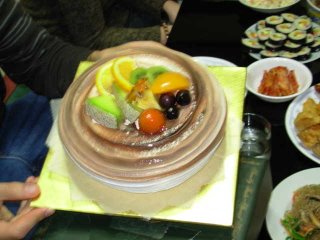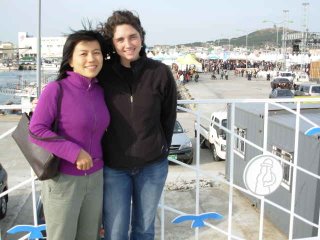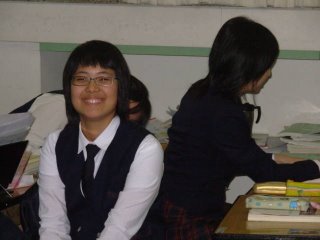Monday, December 04, 2006
"Sorry, I don't English."
An Old Tree, Snow, Quail and Archery on Sunday

Our first stop was the oldest tree on Jeju island (over 400 years old). After snapping some photos of the tree, we drove a little further, eventually arriving in what felt like the middle of a forest. I could not believe I was still on an island; we had been transported to a winter wonderland.
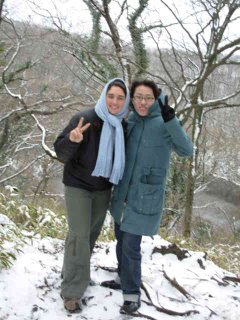
As we hiked through the woods, I enjoyed the silence that is so rare in Korea. The birds, bugs, animals, even people were all hiding away somewhere warmer, as our shoes crunched the snow and our breaths froze in the air. We were hiking a "small mountain", in Korean they're called "Odums" and there are 360 of them on Jeju Island. Odums were formed from lava when the island itself was formed, the largest "odum" being Halla Mountain itself. Each odum has a crater at the top of it, but the odum that we saw today is the only one that actually has water in the crater.
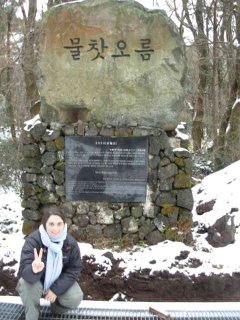
After the hike we enjoyed a lunch of quail, which was the best quail I've ever had. We dipped thin slices of raw quail into boiling water for a few minutes and then into a sort of wasabi/soy sauce mixture before eating them...it was really good. At the end of the meal we had soup and noodles.

After lunch we headed to the traditional archery place, which turned out to be sort of like a shooting club, but for archery. It was a really nice facility and the teacher was very patient with us.
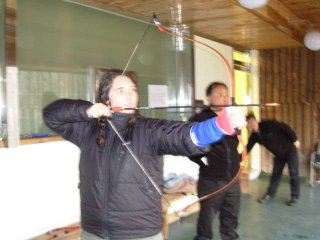
It was a lot harder than it looks; I was just happy when I could hit the board, let alone the bull's eye. After I all my arrows had been shot for the last time, Mr. Kim handed me his last arrow and I shot it right into the target. I was pretty excited and so was everyone else; it was a good ending to a great day!
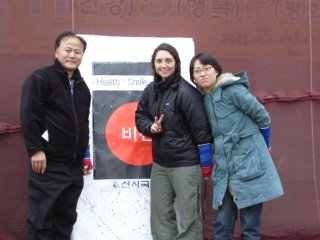 On the left is Mr. Kim, me and Soyeon. You can't see it, but in the picture is the arrow that I shot right into the target on my last shot for the day!
On the left is Mr. Kim, me and Soyeon. You can't see it, but in the picture is the arrow that I shot right into the target on my last shot for the day!
Sunday, December 03, 2006
Joongang Girls High School Winter Festival 2007
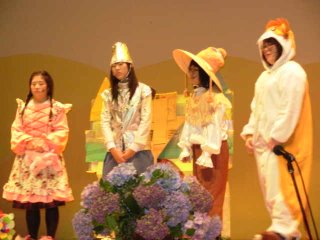
Dorothy, the Tin Man, Scarecrow (Eunae) and the Lion from the Wizard of Oz. At one point Dorothy said "F#$! you!" to the wicked witch; all the girls in the auditorium got it but luckily my principal nor any other teacher heard or understood the meaning.
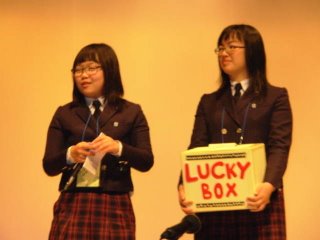
Between performances, they would pull out the "Lucky Box" and call a teacher up to the front to pull a name out of it; the winner got movie tickets. I was called up twice, the first time because my name was on the list and the second time because the girls started chanting my name. It was a little daunting to realize that 800 of the students in the autditorium (2/3) were my students! Eunae, my sister, is the student on the left. I think the "Lucky Box" was the students' favorite part of the program, because they would chant "Lucky Box" at every little break, sometimes even during the program...
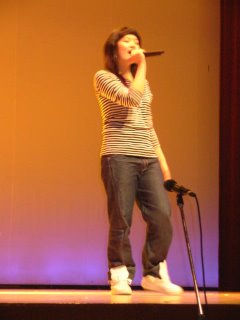
One of my 2nd grade students singing an English pop song...
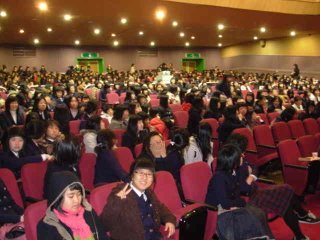
This is what the auditorium looked like. All the teachers' seats were in the front two rows, which was nice for the teachers; however, it also meant that the students were left to do be as noisy as they saw fit.
Friday, December 01, 2006
밥 먹어요 (in English: I eat rice.)
Wednesday, November 29, 2006
Spick and Span
Birthday Party Photos
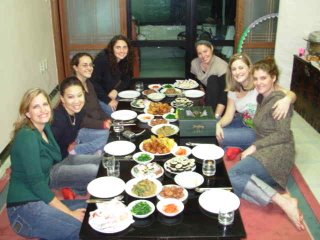 We moved what little furniture we have out of our living room and set up extra tables for the party!
We moved what little furniture we have out of our living room and set up extra tables for the party!
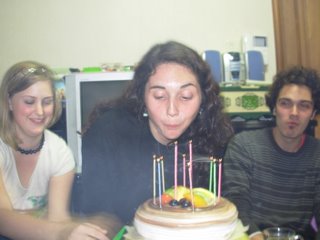 Koreans make it easy to blow out the candles; they have two longer candles that represent 10 years each and 6 smaller ones for my 26 years...
Koreans make it easy to blow out the candles; they have two longer candles that represent 10 years each and 6 smaller ones for my 26 years...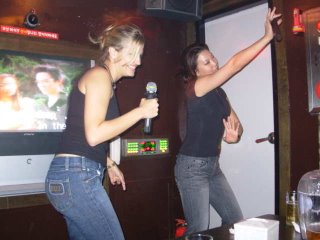 After my house we went to a nore bang (singing room is the direct translation) where Emerald and Julienne were really tearing it up!
After my house we went to a nore bang (singing room is the direct translation) where Emerald and Julienne were really tearing it up!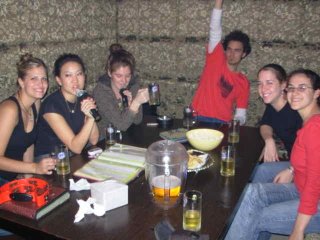 These 6 ETAs live on Jeju Island with me! Singing is a big part of Korean culture; although, for the most part Koreans have really nice voices so it's easy to understand why they like to sing. Americans on the other hand...
These 6 ETAs live on Jeju Island with me! Singing is a big part of Korean culture; although, for the most part Koreans have really nice voices so it's easy to understand why they like to sing. Americans on the other hand...Tuesday, November 28, 2006
The Fish Festival
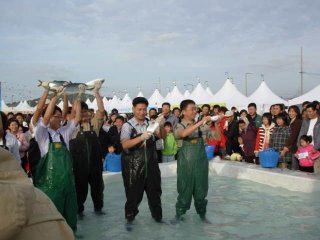 At the fish festival you can pay $10 to get in the pool and try to catch a fish with your hands (you wear gloves). The fish themselves are worth 30$ each, so if you can catch one or two you're doing pretty good.
At the fish festival you can pay $10 to get in the pool and try to catch a fish with your hands (you wear gloves). The fish themselves are worth 30$ each, so if you can catch one or two you're doing pretty good.
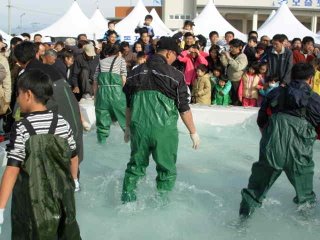 There are about 10 people in the pool at a time and about 15 fish; you are competing against the other people to grab as many fish as you can and throw them in a basket before there are no more.
There are about 10 people in the pool at a time and about 15 fish; you are competing against the other people to grab as many fish as you can and throw them in a basket before there are no more.
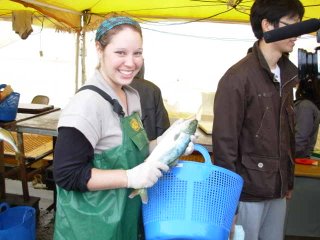 My friend Gretchen with her fish.
My friend Gretchen with her fish.
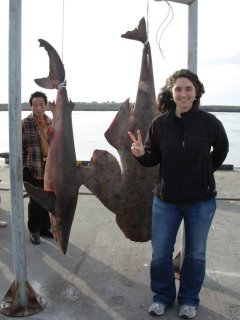 Here I am with two huge dead fish; the one on my right is a shark.
Here I am with two huge dead fish; the one on my right is a shark.
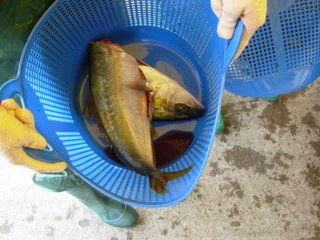 Gretchen's fish after they cut the head off.
Gretchen's fish after they cut the head off.Monday, November 27, 2006
생일주가함니다 in English: "Happy Birthday to you"
Thursday, November 23, 2006
Happy Thanksgiving!
Sunday, November 19, 2006
Early Thanksgiving in Seoul
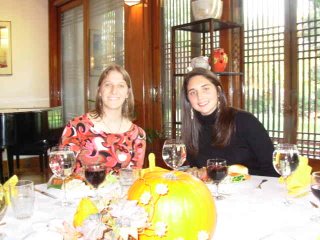 My friend Sara and I, with full plates of delicious food. It was catered by a hotel from the military base in Seoul; the food was delicious!
My friend Sara and I, with full plates of delicious food. It was catered by a hotel from the military base in Seoul; the food was delicious!
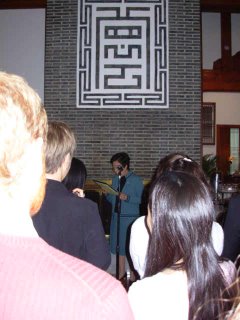 The Fulbright director, Mrs. Shim gave a short address, followed by a short speech by Ambassador Vershbow.
The Fulbright director, Mrs. Shim gave a short address, followed by a short speech by Ambassador Vershbow.
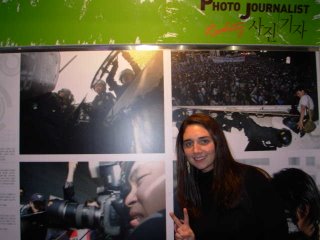 After the meal, as we headed back to our hotel, we came upon this interesting outdoor photo exhibit, the subject of which was quite amusing. We spotted it from across the street and decided to check it out. As we got closer we found that it was a very dramatic photography exhibit about photojournalism. The entire exhibit, (some 200 pictures or so) are "action" shots of photojournalists doing their jobs (in other words, the whole exhibit was composed of photos of photographers taking photos.) The title of the exhibit was "Photojournalist Reality". It seemed like the exhibit might have been motivated by a sincere feeling of under-appreciation. In the picture above, I am posing in front of one of the "action" shots of photojournalists on the job.
After the meal, as we headed back to our hotel, we came upon this interesting outdoor photo exhibit, the subject of which was quite amusing. We spotted it from across the street and decided to check it out. As we got closer we found that it was a very dramatic photography exhibit about photojournalism. The entire exhibit, (some 200 pictures or so) are "action" shots of photojournalists doing their jobs (in other words, the whole exhibit was composed of photos of photographers taking photos.) The title of the exhibit was "Photojournalist Reality". It seemed like the exhibit might have been motivated by a sincere feeling of under-appreciation. In the picture above, I am posing in front of one of the "action" shots of photojournalists on the job.
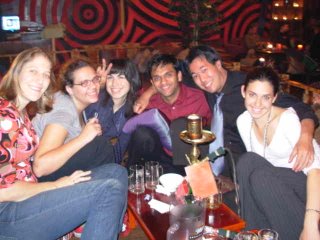 Saturday night we went to a hooka bar; it was really nice to catch up with some of the ETAs that I don't ever get to see.
Saturday night we went to a hooka bar; it was really nice to catch up with some of the ETAs that I don't ever get to see.
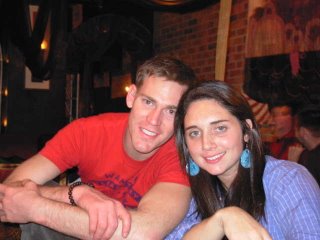 Here I am with my good friend, Dana; he and I are probably going to teach a winter camp together in January after I get back from the United States.
Here I am with my good friend, Dana; he and I are probably going to teach a winter camp together in January after I get back from the United States.
Wednesday, November 15, 2006
Su Neung Day: The test that determines the future
Photos of Su Neung Day at My School
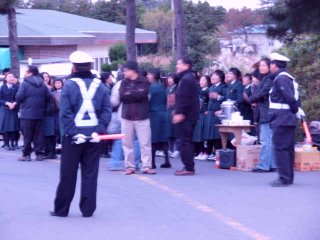 At least a dozen police officers were on the street outside of our school, monitoring everything and stopping traffic for the students who arrived at school to take the exam.
At least a dozen police officers were on the street outside of our school, monitoring everything and stopping traffic for the students who arrived at school to take the exam.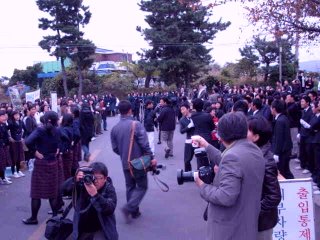 Photographers from local newspapers and cameras from the local television station were there snapping photos. One jouranlist interviewed me briefly, asking if I had ever seen anything like this before. Of course my answer was: "No. Never."
Photographers from local newspapers and cameras from the local television station were there snapping photos. One jouranlist interviewed me briefly, asking if I had ever seen anything like this before. Of course my answer was: "No. Never."
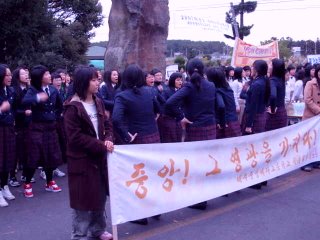 Here are my students holding up their banner (Apparently it says something along the lines of: "Blow that test away!") There were about 10 clusters of students from different schools.
Here are my students holding up their banner (Apparently it says something along the lines of: "Blow that test away!") There were about 10 clusters of students from different schools.
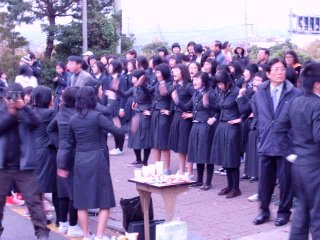 These students were standing outside cheering from 5am-8:40am, when the test actually began. Most of the older students (3rd graders) who were taking the test arrived around 7am, but the girls were there early in order to get the best cheering position.
These students were standing outside cheering from 5am-8:40am, when the test actually began. Most of the older students (3rd graders) who were taking the test arrived around 7am, but the girls were there early in order to get the best cheering position.
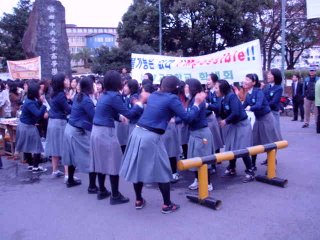 As the 3rd grade students arrived (the equivalent to American Seniors in high school), they gave them a cheer and some candy or coffee as they went in to take the exam.
As the 3rd grade students arrived (the equivalent to American Seniors in high school), they gave them a cheer and some candy or coffee as they went in to take the exam.
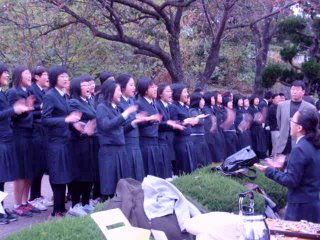 The cheers were quite elaborate; some involved dancing and gymnastics. They were led by 3 or 4 older students, and the rest of the students were class leaders or involved in student government.
The cheers were quite elaborate; some involved dancing and gymnastics. They were led by 3 or 4 older students, and the rest of the students were class leaders or involved in student government.
Saturday, November 11, 2006
Why Not?
Thursday, November 09, 2006
Happy 빼빼로(Pepero) Day!!!
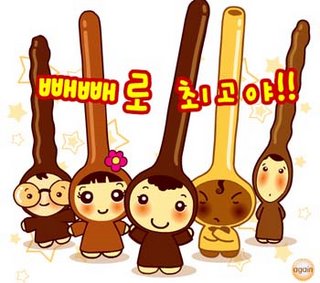
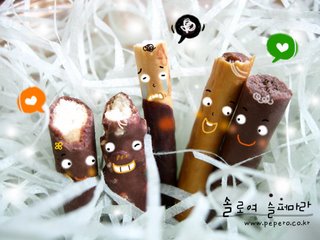
Well, tomorrow is November 11th, which means it's 11/11. Some of you might ask...is it Jenn's birthday? Is there something that I'm forgeting? Don't worry, you have probably never heard of the holiday, but tomorrow is 빼빼로 Day (in English Pepero Day!) This is a national holiday among Koreans, and it's very interesting because Pepero is the brand name of a type of candy. It would be like having a national Snickers Day in the United States, where everyone gives each other little Snickers bars to celebrate. The candy is a long thin cookie, about the size of a pencil, that is dipped in chocolate. I have yet to try one of these treats, but the reason November 11th is the holiday, is due to the resemblance of 11.11 to the actual candy. Unfortunately tomorrow is a Saturday so I will not be at school, and therefore unable to see how many students would have given me Pepero! I'm tempted to come to school anyways, even though I don't have any classes to see if I get any! Giving someone Pepero means that you really really like or even love them. What an ingenius ploy; to name a holiday after your product... it certainly guarantees a certain number of sales every year, even if people don't eat them for the other 365 days (which might be the case, as I do not see that many Koreans eating Pepero on a regular basis.) Happy Pepero Day!
Sunday, November 05, 2006
Happy Jeju Halloween!
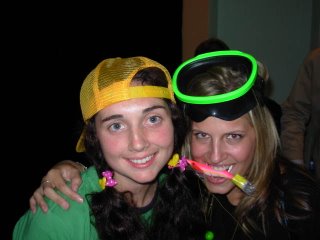 I was Punky Brewster and fellow Jeju Islander, Emerald, was a henyo, one of the female diving women that are legendary on Jeju Island.
I was Punky Brewster and fellow Jeju Islander, Emerald, was a henyo, one of the female diving women that are legendary on Jeju Island.
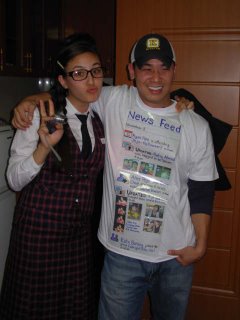 Christina was a Korean high school student, and David went as "Facebook"; an internet blog site that many of the ETAs are members of.
Christina was a Korean high school student, and David went as "Facebook"; an internet blog site that many of the ETAs are members of.
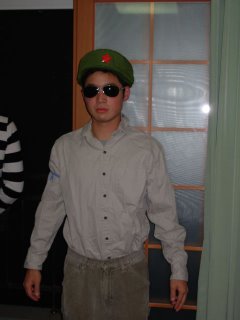 Ryan Park was Kim Jong Il and looked the part, despite the fact that he is a little too thin to be Kim Jong Il...
Ryan Park was Kim Jong Il and looked the part, despite the fact that he is a little too thin to be Kim Jong Il...
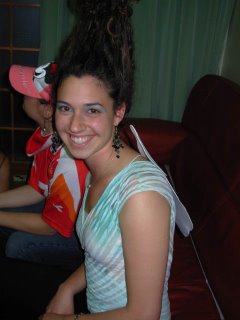
Alyssa was a space cadet...
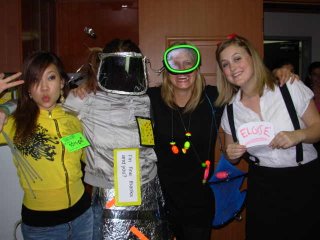 These four Jeju Islanders looked great in their costumes! From left: Julienne was a Chinese person in Korea (She's Chinese so this might have been the most authentic costume; Lauryn was a futuristic Korean student from year 3000; Emerald was a diving woman; and Kate was "Eloise" from the children's series.
These four Jeju Islanders looked great in their costumes! From left: Julienne was a Chinese person in Korea (She's Chinese so this might have been the most authentic costume; Lauryn was a futuristic Korean student from year 3000; Emerald was a diving woman; and Kate was "Eloise" from the children's series.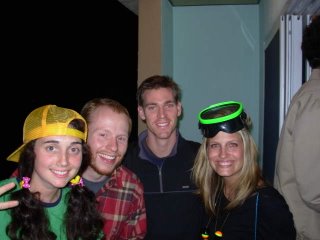 Here I am with Kiehl and Dana... Kiehl went as another of the ETAs who didn't make it down and Dana was a Korean hiker... it was really great to see both of them!
Here I am with Kiehl and Dana... Kiehl went as another of the ETAs who didn't make it down and Dana was a Korean hiker... it was really great to see both of them!
Friday, November 03, 2006
Photos of My Students....
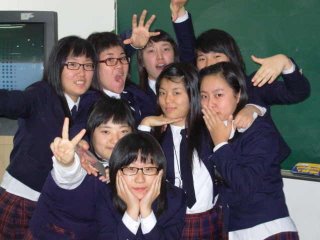 These are my more rowdy girls...this class isn't a bad class, but definitely has a lot of energy and can be hard to handle... they're pretty cute though.
These are my more rowdy girls...this class isn't a bad class, but definitely has a lot of energy and can be hard to handle... they're pretty cute though.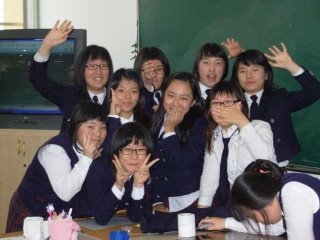 Here I had to take another picture of these girls, because one of the girls walked into the room right after I had taken the picture.
Here I had to take another picture of these girls, because one of the girls walked into the room right after I had taken the picture.
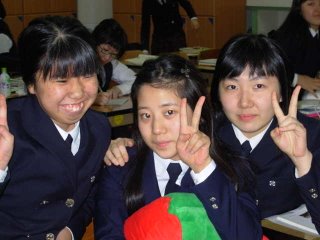 These girls are in one of my better classes; the girl in the middle, Yu-Rah is one of the best English speakers in the second grade...
These girls are in one of my better classes; the girl in the middle, Yu-Rah is one of the best English speakers in the second grade...
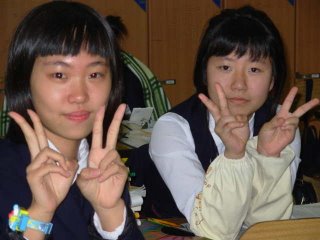 As you can see; I wasn't kidding when I said EVERYONE makes the peace sign in pictures!
As you can see; I wasn't kidding when I said EVERYONE makes the peace sign in pictures!
Wednesday, November 01, 2006
November
Friday, October 27, 2006
Squid Ink, North Korea and Halloween
On a lighter note, last night I tried abilone and boiled squid with squid ink, a very interesting meal. It was me, my co-teacher and three other Korean teachers, all men and about 30 years my senior. First we went and bought the abilone and the squid at a fish market, where they bargained with the vendors and I stared at the wide variety of live fish swimming around in tanks and bowls. They spent $100 on abilone and squid and then we took it to a restaurant where we were charged another $30 for them to prepare the fish for us and for the soju that was consumed. We ate most of the abilone raw, but there was also a sort of chowder with rice in it that we ate at the end which was made with abilone and they boiled the squid, so it turned purple and was covered in its own black ink... abilone is a delicacy here and they believe that it is very nutritious, which it probably is, but it's not soft like the sashimi, rather it's as if you are chewing on a muscle or something. There are parts of the abilone that are very tough and almost hard. The squid was interesting, and I wish I had my camera, because it was quite a sight, the purple squid cut up and covered in black ink. I'm not a huge fan of squid, but it's sort of like rice, hard not to like because it's quite bland. We ate a wonderful meal, complete with plenty of soju (Korean liquor made from rice, similar to sake). From there we went to a nore bang, or "singing room" as it translates to English where I was asked to sing songs like "Let It Be" by the Beatles and "My Way" by Frank Sinatra, songs that I did not listen to in my youth.
Halloween is on Tuesday, so I have been teaching a lesson on Halloween all week, very fun. I start off with a slideshow of jack-o-lanterns, witches, and Americans in costumes, then we play pictionary with Halloween images and finally, I make all the girls say trick or treat on their way out of class, and give them all a piece of candy! It's has been really fun to share such a fun holiday with them!
Monday, October 23, 2006
Purple Orchids
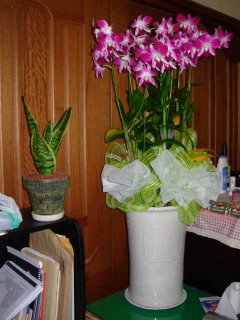 Well, Tonight we went to dinner and we had a great time with some of my parents' friends. It was just my Korean parents, another couple and me. We ate Kalbi, which is the pork meat that is grilled right at your table, a very common dish for eating out in Korea. When we finished our meal, we got up to leave and went outside. The friend smoked and my Korean mother and I drank coffee in the parking lot while everyone chatted with the owner and his wife. (Usually when you go out to eat in Korea you go to a friend or family member's restaurant; this could have to do with the fact that there are soooo many restaurants, it's good to support a friend. Also, Koreans are big on connections and loyalty.) Anyways, as they finished up their conversation all of a sudden I watch my host father go into the restaurant and emerge with a four foot tall plant in a ceramic pot. It most definitely looks like an orchid to me, but I still haven't gotten used to seeing them everywhere I go. The friend is saying, "for Jennifer; in her room" and I'm thinking oh my gosh; it's beautiful, but will it really fit in my room? Where am I going to sleep? That is a slight exaggeration, but my room really is tiny. In my head I thought it was some sort of a joke, because it just seemed weird that they would give me this huge plant; I had still not even met the owner of the restaurant and the plant clearly came from the restaurant. I thought that they had just given it to my host parents and it was the friend's idea that the plant go in my room. I only had one option at this point, the most common option, which is to wait and see what happens. Sure enough, when we got home my host father marched right into the house, into my room and placed the enormous house plant on my desk! He told me to water it three times a day, and I still feel as though I'm a little over my head in that regard, because it's such a beautiful plant that if it dies under my watch I will be devestated. Anyways, as you can see from the picture it really is beautiful and it will be a treat to wake up to it every morning. As for my weekend, it was really nice. I am growing increasingly busy with social engagements with teachers/friends that I work with, my family and co-teacher from school, not to mention the other Fulbright ETAs on the island that I rarely see anymore. I find myself booked up almost every weekend which is really nice, because I enjoy spending time with Koreans more than any aspect of my time here. In school I have had some small discipline problems to deal with; the main problem is talking while I'm trying to teach, which can get way out of hand really quickly with forty students in a classroom. On Wednesday I will start my Halloween lesson which should be fun, because the students work so hard, so we can play games and I will pass out candy!
Well, Tonight we went to dinner and we had a great time with some of my parents' friends. It was just my Korean parents, another couple and me. We ate Kalbi, which is the pork meat that is grilled right at your table, a very common dish for eating out in Korea. When we finished our meal, we got up to leave and went outside. The friend smoked and my Korean mother and I drank coffee in the parking lot while everyone chatted with the owner and his wife. (Usually when you go out to eat in Korea you go to a friend or family member's restaurant; this could have to do with the fact that there are soooo many restaurants, it's good to support a friend. Also, Koreans are big on connections and loyalty.) Anyways, as they finished up their conversation all of a sudden I watch my host father go into the restaurant and emerge with a four foot tall plant in a ceramic pot. It most definitely looks like an orchid to me, but I still haven't gotten used to seeing them everywhere I go. The friend is saying, "for Jennifer; in her room" and I'm thinking oh my gosh; it's beautiful, but will it really fit in my room? Where am I going to sleep? That is a slight exaggeration, but my room really is tiny. In my head I thought it was some sort of a joke, because it just seemed weird that they would give me this huge plant; I had still not even met the owner of the restaurant and the plant clearly came from the restaurant. I thought that they had just given it to my host parents and it was the friend's idea that the plant go in my room. I only had one option at this point, the most common option, which is to wait and see what happens. Sure enough, when we got home my host father marched right into the house, into my room and placed the enormous house plant on my desk! He told me to water it three times a day, and I still feel as though I'm a little over my head in that regard, because it's such a beautiful plant that if it dies under my watch I will be devestated. Anyways, as you can see from the picture it really is beautiful and it will be a treat to wake up to it every morning. As for my weekend, it was really nice. I am growing increasingly busy with social engagements with teachers/friends that I work with, my family and co-teacher from school, not to mention the other Fulbright ETAs on the island that I rarely see anymore. I find myself booked up almost every weekend which is really nice, because I enjoy spending time with Koreans more than any aspect of my time here. In school I have had some small discipline problems to deal with; the main problem is talking while I'm trying to teach, which can get way out of hand really quickly with forty students in a classroom. On Wednesday I will start my Halloween lesson which should be fun, because the students work so hard, so we can play games and I will pass out candy!
Sunday, October 22, 2006
More Photos of Japan...
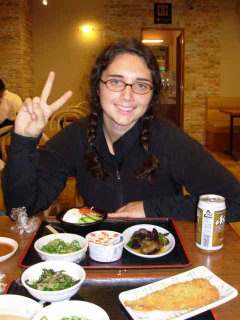 Here I am on my first morning in Japan, having a 7 am breakfast after a 6 hour overnight bus ride...
Here I am on my first morning in Japan, having a 7 am breakfast after a 6 hour overnight bus ride...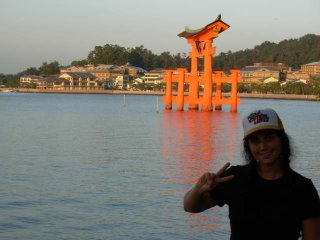 The shrine on Miyajima Island right before we swam out to it...
The shrine on Miyajima Island right before we swam out to it...
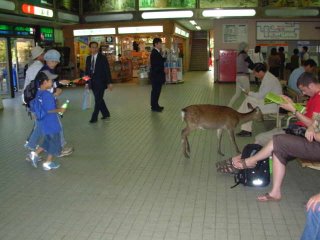 As we got off the ferry at the ferry station on Miyajima Island we were greeted by deer that were roaming around the terminal. Apparently all the tourists feed the deer too much and now they are more like varments than deer; they roam around eating people's food and getting into trash, etc.
As we got off the ferry at the ferry station on Miyajima Island we were greeted by deer that were roaming around the terminal. Apparently all the tourists feed the deer too much and now they are more like varments than deer; they roam around eating people's food and getting into trash, etc.
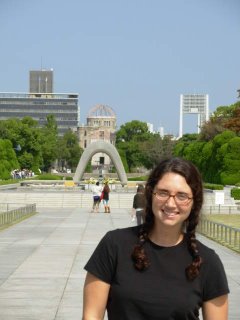 In Hiroshima at the Peace Memorial Park, following the 7am breakfast, which followed the 6 hour overnight bus ride.
In Hiroshima at the Peace Memorial Park, following the 7am breakfast, which followed the 6 hour overnight bus ride.
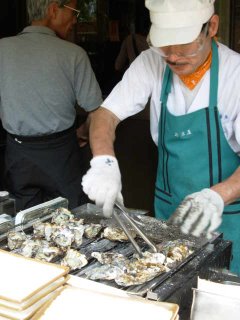 The oysters on the island were amazing; they grilled them inside their shells then popped them open and we ate them; they were really good...
The oysters on the island were amazing; they grilled them inside their shells then popped them open and we ate them; they were really good...
 The shrine on Miyajima Island at dusk; it really was beautiful...
The shrine on Miyajima Island at dusk; it really was beautiful...
